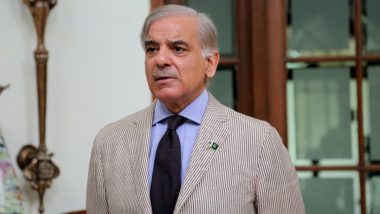Islamabad, February 10: The IMF has delayed the signing of the much-sought-after bailout package with cash-strapped Pakistan after talks between the two sides remained inclusive, according to the global lender which said that discussions will continue virtually in the coming days.
Pakistan, whose foreign exchange has dropped below USD 3 billion, is in desperate need of financial assistance and a bailout package from the IMF to prevent it from economic collapse. The 9th review is currently pending and its successful completion will bring USD 1.1 billion in the form of the next tranche.
An IMF mission led by Nathan Porter visited Islamabad from January 31 to February 9 to hold discussions under the ninth review of the authorities' programme supported by the IMF Extended Fund Facility (EFF) arrangement. Pakistan Crisis: Government Putting Up Brave Face Amid Deadlock Over IMF Bailout, Says Report.
The Pakistan side was led by Finance Minister Ishaq Dar. In a statement Porter said, the IMF team welcomes Pakistan Prime Minister Shehbaz Sharif's commitment to implement policies needed to safeguard macroeconomic stability and thanks the authorities for the constructive discussions. Pakistan Foreign Minister Bilawal Bhutto Zardari Says Government, IMF Should Consider Plight of Flood-Hit People.
“Considerable progress was made during the mission on policy measures to address domestic and external imbalances,” he said. “Virtual discussions will continue in the coming days to finalise the implementation details of these policies,” he added.
Key priorities include strengthening the fiscal position with permanent revenue measures and reduction in untargeted subsidies while scaling up social protection to help the most vulnerable and those affected by the floods, he said.
Among other priorities include allowing the exchange rate to be market determined to gradually eliminate the foreign exchange shortage; and enhancing energy provision by preventing further accumulation of circular debt and ensuring the viability of the energy sector.
“The timely and decisive implementation of these policies along with resolute financial support from official partners are critical for Pakistan to successfully regain macroeconomic stability and advance its sustainable development,” Porter said.
However, the Pakistan government initially conveyed to the media at the conclusion of talks on Thursday evening that everything thing was settled and Dar would announce the details at a press conference.
But the conference was postponed and instead Finance Secretary Hamed Yaqoob Shaikh told the media that the two sides agreed on a set of prior actions but a staff-level agreement (SLA) on the Memorandum of Economic and Financial Policies (MEFP) was not signed yet.
“All issues have been settled and prior actions agreed upon,” said Shaikh, adding that the SLA would be finalised in the days to come. The IMF mission is going to share the details of talks with the top IMF officials in Washington and then issue a statement.
The finance secretary rejected the impression that there was any disagreement by saying that “all things have been settled”. He, however, refused to divulge the details of the prior actions. He said the finance minister would address a press conference after the fund had issued its statement.
The IMF mission came to Pakistan after Islamabad agreed to take tough decisions, including restoring the market-based exchange rate and increasing petroleum prices.
In the first phase, Pakistan's technical discussion with the IMF went on till February 3. It was followed by the second phase of policy negotiations that concluded on February 9 to finalise a memorandum of economic and financial policies.
Pakistan inked a USD 6 billion IMF programme in 2019, which last year expanded to USD 7 billion. Earlier, talks on the review were originally scheduled to be held in October but were delayed after Dar refused to implement some of the conditions of the fund after taking the finance ministry from Miftah Ismail.
Pakistan's reserves have fallen below USD 3 billion and the country is feared to default on its external liabilities unless the IMF unlocks its funds for it. The availability of IMF money will avoid the default but it is feared to bring a tsunami of price hikes.













 Quickly
Quickly


